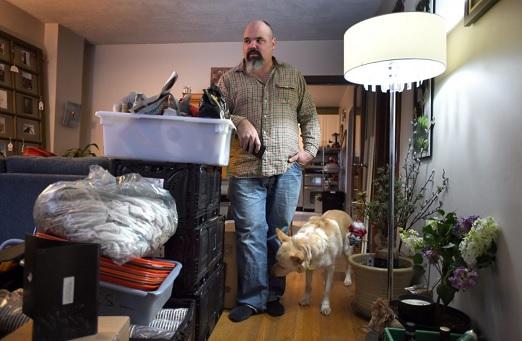
He wears a mask, and his face grows to fit it. ~George Orwell, “On Shooting An Elephant”
Much has already been said on the Boyden scandal, more than likely too much. I would be foolhardy indeed to attempt to recapitulate the eloquence of indigenous writers and scholars like Hayden King, and will not make any such attempt here. Instead, as a white, relatively comfortable Canadian, I’d like to come at the issue tangentially: in particular, regarding the question of identity itself.
A friend strongly rooted in her Jewish identity once challenged me, in a manner similar to the indigenous “where are you from” gambit. She was puzzled that I didn’t seem to have a clearly marked identity of my own. I was uncharacteristically speechless. I have dwelt on that question ever since. I had, and still have, no fully satisfactory answer for her. I remain amazed that other people I know—but not all other people—seem so clear on the matter.
The identity field seems impossibly strewn and complex to me. I have a name, and a family, and citizenship in a country that is founded upon civic engagement—not, thankfully, on blood or ethnicity. I have specific interests that keep me working and involved. I’m male, and I’m white, and I share in colonial privilege too, but questioning all of those privileges is also part of what I am. So, then, who am I? I dunno. What community claims me? Ditto. To what community am I accountable? Ditto.
Indeed, what is a community? Again, I have little idea: the way the term is thrown around these days, a lot gets erased. There is talk of an indigenous community, for example, but in fact there are a great many, and none of them is monolithic.
Perhaps because of privilege, both my identity and my community, whatever they happen to be, are more amorphous. There is less call to define, to include and exclude, to identify markers, to band together. Nevertheless, the same social processes have been at work. I did not get here by myself.
But back to Boyden. It is clear that, in many eyes, a grievous wrong has been committed: a writer, claiming an indigenous connection by ancestry, has done well in the CanLit realm, been showered with acclaim, has won prizes, awards and grants reserved for indigenous people, and made political interventions in the slow process of reconciliation between First Peoples and the rest of Canada. Most of that work remains to be done, and it is no doubt confounded by self-appointed spokespeople who are accountable to no one, and whose claims to a shared indigenous heritage, in the present instance, are now in considerable doubt. The reaction has been completely understandable.
We have heard very little of substance from Boyden himself, the erstwhile culture-bearer of the indigenous peoples. His Facebook statement seems defensive, and is far from illuminating. But here we need to step cautiously. Judging from an ill-fated interview three years ago, he reacts badly to personal questions, even if he was perhaps understandably provoked on that occasion by the superficiality of the interviewer. Retreating now under withering fire, he may well have been properly exposed as a fraud, and perhaps relative silence is all that is left to him.
But if he does not possess an “authentic” indigenous identity, who is he? Or, as Hayden King reiterates, “where is he from?”
Identity is not related to blood, unless one accepts the discredited Nazi notion of Blutsgefuhl—“blood (racial) consciousness”—or the colonial masters’ invidious “blood quantum” measure. Instead, it derives from the social, in which individuals find themselves immersed at birth. It’s a complex construct, a web of personal interactions, social scripts, and the internal stories one tells about oneself. Identities also seem to take hard form under duress: the most salient aspect of the identities of racialized minorities is the fact of their oppression, giving rise to defiant expressions of identity that too often seem, in dialectical fashion, to valorize the categories into which the dominant power structure has placed them.
“Identity” at its most fundamental implies connection, in a world that reinforces only the most superficial relations (e.g., social media “friends” and “followers” and what-not). It is a cry for community, for the social as opposed to the atomistic individual. And it is here that the Boyden case invites deeper interrogation.
The suspicions that have surfaced about him may well be entirely well-founded. That is, that he constructed an identity in order to reap material and cultural rewards. But consider this: we all to a greater or lesser degree construct ourselves, confabulating who we are. We fill in the gaps to make coherent internal narratives. We drop some discordant elements, we keep others, and we imagine still more. We discover ourselves, in others and in the world, in our real and in our imagined connections. By immersing himself in indigenous lore, tradition and history, Boyden may well have fashioned a mask. But I am tantalized by the possibility, however faint, that he became the very mask that he donned.

 Christmas is an entirely secular holiday for me, and yet I plunge in, year after year, just basking in it. The raw sentimentality pleases me.
Christmas is an entirely secular holiday for me, and yet I plunge in, year after year, just basking in it. The raw sentimentality pleases me.










Recent Comments